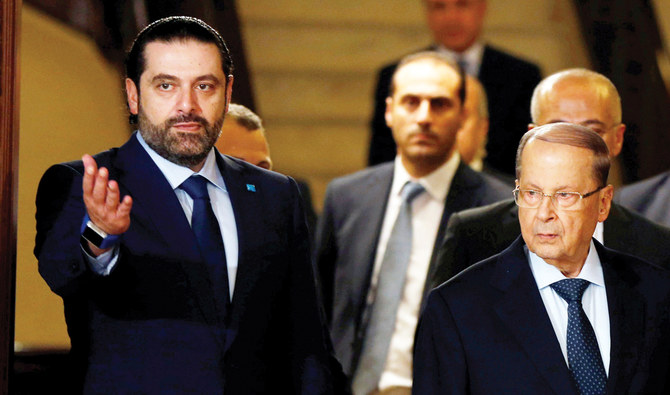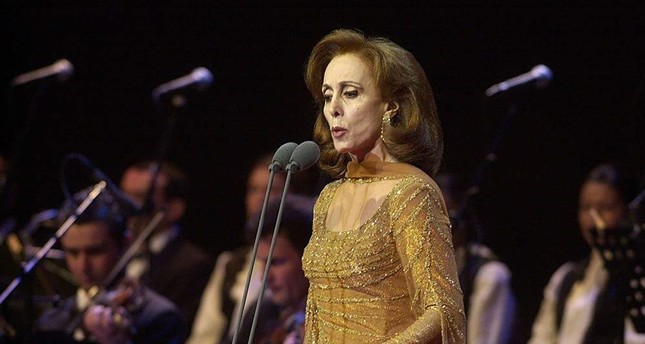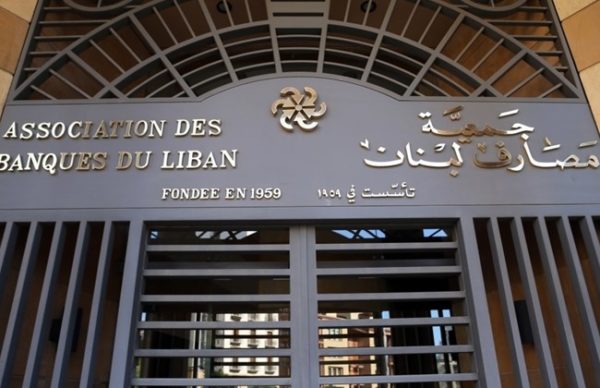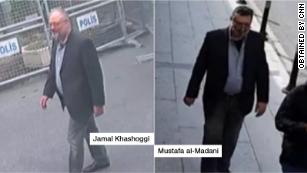BEIRUT, Dec. 27 (Xinhua) — An official of the World Food Program (WFP) urged on Friday the return of Syrian refugees in Lebanon to their homeland in 2020, the National News Agency reported. Abdallah al-Wardat, WFP Lebanon Country Director, said “the return of Syrian refugees to their country has become very urgent and it should […]
by reuters — Lebanon’s central bank governor said on Thursday “nobody knows” how much more the cost of dollars could rise on the black market as a dire crisis piles pressure on a 22-year-old currency peg. Deep in political turmoil, Lebanon is grappling with its worst economic crisis in decades and battered confidence in its […]
by AP — BEIRUT – Dozens of protesters staged a sit-in outside the central bank and the Lebanese Banks’ Association building Thursday to protest the banks’ policies amid unprecedented capital controls. The protesters called on citizens to stop paying their loans and taxes and demanded that loan payments be rescheduled after amending interest rates. Banks […]

by arabnews.com — BEIRUT: Tensions between Lebanon’s president and former prime minister have flared after they accused each other of being to blame for the turmoil engulfing the country. A recession, massive street protests and a political crisis have created financial and security chaos. Lebanon has had a caretaker government since Oct. 29, when Saad Hariri resigned as prime minister after nearly two weeks of protests. He has clashed with President Michel Aoun about the leadership and composition of a new administration. “The problem with the president is that he is acting as if nothing has happened in the country, and he is trying to act smart by endorsing the demands of the revolution, and my stance is clear, I will not be represented in this government and I will not nominate anyone, nor will I give it a confidence vote,” said Hariri. “Now they are targeting the political legacy of the Hariri family, and they will try to hold it responsible for all the calamities that have befallen the country, but whoever tries to bury Hariri’s legacy will be as if he would be burying himself. Let us see who really stole from the country. I will not cover anyone, and they should do the same thing.”
Aoun responded to Hariri by saying: “Does he envy me for my resilience and calmness in trying to control the situation, or does he want me to act foolishly and badly? We waited for 100 days for him (Hariri) and nothing came out. We waited for someone who kept hesitating. I want, and I do not want, as if someone was playing with a daisy. A government cannot be formed in this manner.”

The Daily Star BEIRUT: Caretaker Prime Minister Saad Hariri launched Tuesday his harshest criticism yet of Gebran Bassil, saying he would not work again with the Free Patriotic Movement leader unless he abandons his “sectarian and racist” speech. “How can you work with someone who is always insulting you? How can you work with such people whose speech is sectarian and racist?” Hariri told a group of reporters at his Downtown Beirut home. “I will not work again with Gebran Bassil, unless he moderates [his policies].” Hariri said that the Future Movement would not be represented in any new government formed by PM-designate Hassan Diab and, for the first time, indicated that the party would not give such a government a vote of confidence in parliament. “I will not be represented, take part in or cover the new government. If required, I will not give it a vote of confidence.” Asked how he would describe Diab’s cabinet – should he succeed in forming one with the backing of the FPM, Hezbollah and the Amal Movement – Hariri said: “The government of Gebran Bassil.” The outgoing premier said he did not regret his decision to resign in response to nationwide protests that erupted on Oct. 17, nor his refusal to be reappointed unless it was on his terms. “I don’t regret my decision,” Hariri said. “My conscience is clear. All my work is to preserve the country.”

Beirut- Asharq Al-Awsat — Lebanon’s caretaker finance minister accused the country’s banks on Tuesday of “trapping” civil servants’ salaries with withdrawal limits that have fuelled public anger in the crisis-stricken country. “What is happening in some Lebanese banks is unacceptable,” Ali Hassan Khalil wrote on Twitter. “They are trapping the salaries of (state) employees that are transferred by the finance ministry every month.” Rocked by two months of anti-government protests and a political deadlock, Lebanon is also facing its worst economic crisis since the 1975-1990 civil war. A liquidity crunch has pushed Lebanese banks to impose capital controls on dollar accounts, capping withdrawals at around $1,000 a month. Some have imposed even tighter restrictions. Some have also capped weekly withdrawals of the Lebanese pound at one million — the equivalent of $660 at official rates — even as the currency has plunged by nearly a third against the dollar on the black market in recent weeks. The tightening controls have prompted public uproar, with many accusing banks of robbing them of their savings. On Tuesday, Khalil said it was a “sacred right” of civil servants to be paid in full and on time. “It is not permissible for this right to be violated,” he said, vowing legal action to ensure public servants can access their salaries in full. At banks in the northern city of Tripoli, tensions soared Tuesday as clients struggled to withdraw their salaries, said an AFP correspondent there. A fight broke out in a branch near the city’s main protest camp after the bank refused to let a customer withdraw dollars. An anti-government street movement has rocked the small Mediterranean country since October 17.
by naharnet.com — Maronite Patriarch Beshara al-Rahi said in his Christmas message on Tuesday that officials have brought Lebanon to economic and financial collapse and the Lebanese to poverty. “Our tragedies come from the fact that our rulers refuse to transfer power, they would rather allocate it, spend lavishly and accumulate debts. They brought the […]

by MEHMET FAHRI DANIŞ dailysabah.com — Music often becomes a uniting element for nations whose citizens have very little in common: Editf Piaf in France, Elvis Presley in the U.S. and Lys Assia in Sweden. In the case of Lebanon, Fairuz – or Nouhad Haddad by her birth name – holds a very special place as she is equally embraced by the country’s multicultural society. The existence of the phenomenon of the nation is closely related to the presence of symbolic motifs that claim to represent it. What makes a community a nation is mostly these symbolic productions that its members unwittingly confirm and participate in producing every day. National anthems and flags, heroes, “sacred” landscapes, national architecture, national cuisines and tourist brochures all contain the archaic emphasis of nationalist movements’ attempts to construct links with the past.
‘The national symbol’
National symbols allow members of communities to feel like part of the national consciousness. Efforts to maintain ties to this consciousness through popular culture are also made – for example, a company identified with a country and is universally known, national athletes competing in the Olympic games or artists representing their country in musical contests. Today, these can serve as more effective tools for emphasizing national consciousness than an antiquated anthem or national flag. When it comes to Lebanon, the cedar tree motif, a symbol of national character, is an excellent example of a nationalist symbol. Used on the first Lebanese flag designed during the mandate rule established in 1920 and in the flag of independent Lebanon in 1943, this figure serves a symbolic function that links the Lebanese with the Phoenicians on the basis of territorial identity. Another symbol for the country as important as the cedar tree is Fairuz, who began her artistic career during the 1950s.
Fairuz’s career

by al-monitor.com — Sarah Abdallah — BEIRUT — An economic and financial crisis looms over Lebanon, the third-highest indebted country in the world in terms of debt-to-gross domestic product ratio, which stood at 151% in 2018. “Given the large public debt … [Lebanon’s] interest payments now exceed 9% of GDP,” the International Monetary Fund (IMF) said in a July report. The IMF also said, “Deposit growth in 2018 was the lowest since 2005 and the BdL [Bank of Lebanon] reserves have now decreased by around $6 billion since early 2018.” The crisis comes with strict banking procedures. Lebanese banks imposed restrictions on deposits and capped withdrawals. They also suspended housing loans and froze transfers abroad. This led to a US dollar scarcity in the Lebanese market and increased its exchange price against the Lebanese pound. The dollar reached 2,400 Lebanese pounds at the money changers in late November, before settling between 1,980 Lebanese pounds and 2,000 Lebanese pounds in sales and purchases during the second week of December. The official rate, however, remained Dec. 20 at 1,507.5 Lebanese pounds on the Beirut Stock Exchange. Remarkably, the exchange rate in Syria also gyrated, hitting 1,000 Syrian pounds against the US dollar, while its value set by the Syrian Central Bank remained at 434 Syrian pounds.
This has led many to wonder about the connection between the two monetary crises. Some Lebanese fear that large amounts of dollars are being smuggled from Lebanon to Syria. But the dollar scarcity in Lebanon has led to the same condition in Syria. Many Syrians hold bank accounts in Lebanon, which at one time was a much more stable market. Now, though, these accounts are being frozen or restricted. US sanctions prohibit American financial institutions from doing business with Syrian banks. Meanwhile, more than 1 million Syrian refugees are registered with the UN High Commissioner for Refugees in Lebanon. The Lebanese government estimates the actual number at 1.5 million Syrians. Add to this the Syrian merchants who deposit their money in Lebanese banks. A Norwegian Refugee Council report quoting World Bank data showed 17% of remittances to Syria come from Lebanon, second only to Saudi Arabia, with 29% of total financial remittances.

By Sarah El Sirgany and Lauren Said-Moorhouse — (CNN) — Saudi Arabia has sentenced five people to death for the murder of journalist Jamal Khashoggi but cleared a former top adviser to Crown Prince Mohammed bin Salman, a public prosecutor said Monday. There was no evidence against Saud al-Qahtani, Saudi Deputy Public Prosecutor Shaalan al-Shaalan announced in a televised press conference Monday. A court also dismissed charges against Ahmed al-Assiri, a former deputy intelligence chief, and Mohammed al-Otaibi, Saudi’s consul general in Istanbul when the murder took place, he said. Al-Qahtani and al-Otaibi were sanctioned a year ago by the US Treasury for their alleged involvement in the murder. Both al-Qahtani and al-Assiri were part of Crown Prince Mohammed bin Salman’s inner circle and were relieved of their duties in the immediate aftermath of Khashoggi’s killing in October 2018. “Saud al-Qahtani was questioned by the public prosecution and was not charged because there was no evidence against him,” al-Shaalan said.
Reading preliminary rulings for 11 people who have been investigated by Saudi Arabia, al-Shaalan said five others who took part in the murder had been sentenced to death. Another three people face a total of 24 years in prison for covering up the murder and violating regulations. He did not reveal any of their names. Khashoggi — a Washington Post columnist and royal insider-turned-critic — was last seen entering the Saudi consulate in Istanbul on October 2, 2018. He had expected to collect documents for his upcoming wedding but was instead killed and allegedly dismembered in the building. His remains are yet to be found.
Verdict slammed as ‘a mockery’
The murder drew international condemnation and the CIA concluded that bin Salman personally ordered the killing. Riyadh’s version of events on October 2 have repeatedly shifted as new details have emerged but it has always maintained that neither bin Salman nor his father King Salman knew of the operation to target Khashoggi. US officials, however, have said such a mission — including 15 men sent from the Kingdom — could not have been carried out without the authorization of bin Salman. Khashoggi’s son Salah described the ruling as “fair” on Twitter Monday. “A fair judiciary is based on 2 principles: justice and quick proceedings. Today’s judiciary was fair to us, the sons of Jamal Khashoggi,” wrote Salah, Khashoggi’s eldest son who handles the family’s relations with the government. “We affirm our confidence in Saudi judiciary on all its levels as it ruled in our favor and achieved justice.” Earlier this year, Salah took to Twitter to deny that a settlement had been reached between his family and the Saudi government after a source told CNN that Khashoggi’s family have received millions of US dollars in cash and assets as compensation for the killing. But Hatice Cengiz, Khashoggi’s fiancée, said the Saudi announcement was “not acceptable.” In a post on Twitter on Monday, Cengiz wrote that she would never forget Khashoggi, nor his “murderers” or “those who are trying to cover up” his murder.



